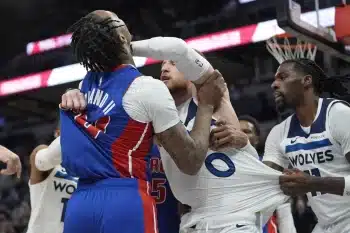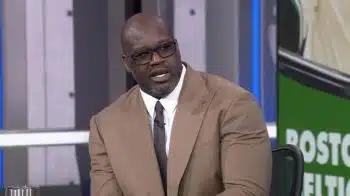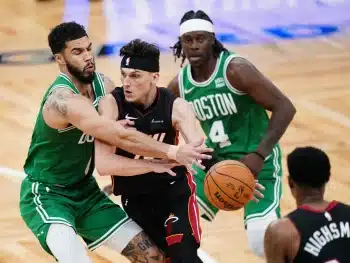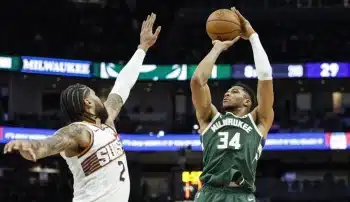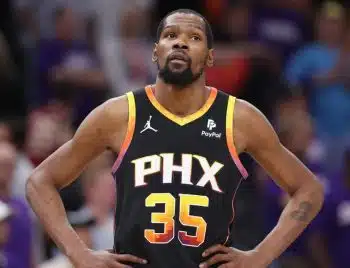NBA
NBA Daily: Blazers’ Early-Season Struggles Cause For Lasting Concern
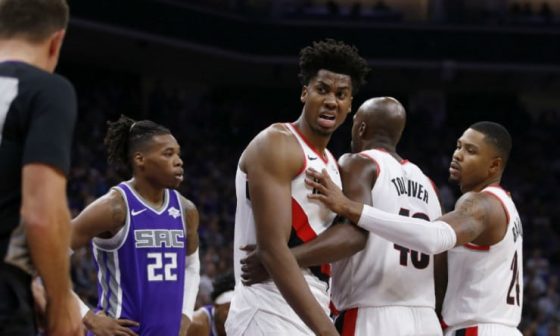
The Portland Trail Blazers’ silver lining has little to do with them.
The expectation coming into this season was that as many as 13 teams in the Western Conference could compete for the playoffs, propelling the number of victories needed to advance to the postseason into the high 40s. Three weeks into 2019-20, the number of teams good enough to vie for a playoff berth is smaller than anticipated. The Phoenix Suns have ascended to respectability and perhaps more, but the Golden State Warriors have been left for dead while the Sacramento Kings and New Orleans Pelicans struggle.
The West is strong, of course, but maybe not so strong that a handful of objectively quality teams will be left on the outside looking in at the postseason come April.
Some expected Portland to stand a tier above that fray coming off a surprising trip to the Western Conference Finals. But any chatter that said this team was more likely to hoist the Larry O’Brien Trophy at season’s end than hope for lottery luck was always misguided. At the crux, it was optimism reflecting last spring’s matchup-dependent outcome that ignored changes sapping them of both depth and continuity.
Less than a month into the NBA calendar, it’s not quite time to panic. Still, with Portland at 4-6 and narrowly escaping an overtime loss to the Atlanta Hawks on Sunday, it might be time to readjust season-long expectations in the Rose City – especially given the Blazers’ upcoming schedule and rash of injuries.
Seven of Portland’s next eight games come on the road. Half of them are against teams that made the playoffs last season, including a lone home tilt versus the stoic Toronto Raptors. Merely going .500 over that stretch would be a major accomplishment for the Blazers given how they’ve fared against inferior competition thus far.
It took an extra period for them to beat the Hawks, playing without John Collins, at Moda Center, while the anonymous Warriors earned their first victory after Stephen Curry’s injury versus Portland last week. Not even a career-high 60 points from Damian Lillard, who’s reached yet another peak in the early going, saved the Blazers from a home loss to the Brooklyn Nets, who, too, are still trying to find themselves.
All of which begs the question: Just where will Portland sit in the standings when the schedule gets more palatable? Plus, the more important one: If the Blazers continue struggling over the next two weeks, will injuries prevent them from making up the necessary ground for a seventh consecutive playoff berth over the season’s remainder?
Outside of Lillard, there’s an argument to be made that Zach Collins is Portland’s most indispensable player. No roster in basketball with real postseason ambitions is lighter on forwards than the Blazers, while Hassan Whiteside’s overall lethargy and struggles to integrate offensively add to his value as a part-time center.
Collins is sidelined until March after undergoing surgery on his dislocated left shoulder. Jusuf Nurkic should make his season debut around then, too, but there’s no telling how effective he’ll be after spending nearly a full year away from the game. Any hopes he’ll immediately regain the high-impact two-way form that made him Portland’s second-best player last season should be quelled. More likely is that Nurkic will take time to fully re-acclimate to the speed and physicality of the NBA game, serving as not much more than a replacement-level player until next fall.
In the meantime, the Blazers are relying on Whiteside and Skal Labissiere in the middle, waiting for Pau Gasol to get healthy enough to play spot minutes off the bench. Lillard has already chastised Whiteside for his lack of urgency as a roll man, and it’s clear to anyone who watched Portland last season that Whiteside leaves much to be desired as a screener — a deficiency that’s plagued him throughout his career.
The Blazers, per usual, rank toward the top of the league in ball screens, despite Whiteside consistently failing to make contact with the primary defender – let alone swallow them at varied angles like Nurkic.
Whiteside has flashed more comfort as a passer from the high post and elbows in Terry Stotts’ system but is still ill-equipped to make plays in space when teams force the ball from the stars in pick-and-roll play. Labissiere, while better than Whiteside, leaves much to be desired in both regards, too. Gasol would certainly help, especially given his threat as a pick-and-pop shooter. But it’s indicative of just how thin the Blazers find themselves upfront that a 39-year-old who hasn’t played since March could give them a lift offensively.
Portland quietly finished third in offensive rating a year ago, only behind the juggernaut Houston Rockets and Golden State Warriors. Stotts’ team currently ranks ninth in offense, scoring just over five fewer points per 100 possessions than last season. While offense is down a bit league-wide, there are signs the Blazers’ relatively slow start on that end will persist.
The franchise talked a big game throughout the preseason about prioritizing pace, a newfound emphasis that’s yet to manifest itself in more transition opportunities, per Cleaning the Glass. But the Blazers rank top-10 in pace regardless, mostly on the strength of taking a higher share of their field goal attempts in the first two seconds of the shot clock than any team in basketball. The problem? Their effective field goal percentage on those shots is 45.8 percent, fourth-worst in the league.
Portland has been just average on the offensive glass after finishing second in offensive rebound rate last season and they’re tallying over 50 fewer passes per game despite replacing Al-Farouq Aminu and Moe Harkless in the rotation with superior playmakers. Anfernee Simons has lived up to the hype in his first season playing regular minutes, but Stotts should probably scrap lineups that include neither of his star guards, especially considering his team’s lack of scheme familiarity. The Blazers’ offensive rating without Lillard and CJ McCollum on the floor is 86.2, a putrid number hardly guaranteed to improve even when factoring in the sample size.
The bright side? Three of Portland’s losses were decided in the game’s final moments, and none of them have come by double-digits. The Blazers are a few fortuitous bounces away from weathering an early-season injury storm and emerging from their first 10 games with a winning record.
But context is crucial — especially in a Western Conference playoff field that remains overcrowded — and it renders Portland’s start concerning. Other than an inevitable shot-making improvement from McCollum, who labored throughout last season before coming alive in the playoffs, just how will this team take meaningful strides not just leading up to Thanksgiving, but over the season’s duration?
It would be foolish to count Portland out entirely. Stotts and Lillard deserve every benefit of the doubt, and their teams enjoy a long track record of playing their best basketball during the second half of the season. But dreams of the Blazers being title contenders have faded entirely and faith in their presumed status as a surefire playoff team seems to be eroding in the immediate future – if not longer.
